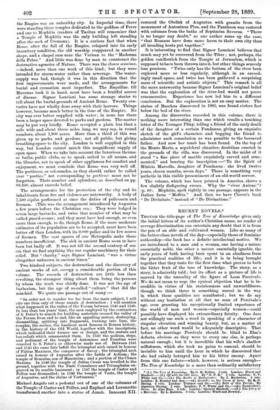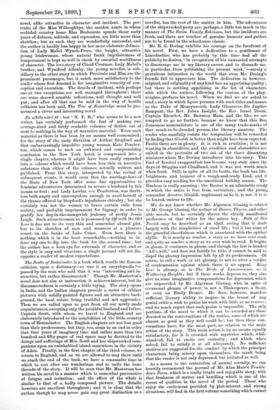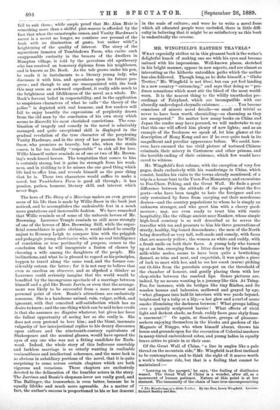RECENT NOVELS.*
THOUGH the title-page of The Tree of Knowledge gives only the initial letters of its author's Christian name, no reader of average discrimination can entertain any doubt that it is from the pen of an able and cultivated woman. Like so many of the better-class novels of the day—especially those of feminine authorship—the book has a definite intellectual motive. We are introduced to a man and a woman, one having a nature essentially noble, the other a nature essentially ignoble, the early years of both having been spent in an aloofness from the practical realities of life; and it is in being brought together that they taste for the first time what proves to both the bitter fruit of the tree of knowledge. The story, as a story, is admirably told ; but its effect as a picture of life is marred by the unreality of the figure of Leon Percivale. We do not mean to urge the cynical objection that he is in- credible in virtue of his stainlessness and -unworldliness, though we think there is something unreal in the way in which these qualities are manifested ; but we do say without any hesitation at all that no man of Percivale's age, even granting his exceptionally limited experience of the world of men and women—especially women—could possibly have displayed his extraordinary fatuity. One does not willingly use such a word in speaking of a character of singular elevation and winning beauty, but, as a matter of fact, no other word would be adequately descriptive. That before his marriage Percivale should be blind to Elsa's defects, obvious as they were to every one else, is perhaps natural enough ; but it is incredible that his wife's shallow selfishness, which she took no pains to conceal, should be invisible to him until the hour in which he discovered that she had calmly betrayed him to his bitter enemy. Apart from this one failure—which, however, is serious enough— The Tree of Knowledge is a more than ordinarily satisfactory
• (1.) The Tree of Knowledge. By G. M. Robins. S vols. London: Hurst and Blackett.—(2.) Off with the Old Lore. By " N. F. B." 2 vols. London: F. V. White and Oo.--(3.) The Scotts of Beshninster. By J. Masterton. 3 vols. London: R. Bentley and Son.—(4.) Giraldi ; or, the Curse of Lore. By R. G. Daring. 2 vols. London: Trubner and Co.—(5.) Both of this Parish. By Algernon Giseing. 2 vols. London : F. V. White and Co.—(6.) Tumbledown Farm. By Alan Muir. 2 vols. London Spencer Blackett. —(7.) The Etory of a Marriage. By L. Baldwin. 3 vols. London: Ward and Downey.
novel, alike attractive in character and incident. The por- traits of the Miss Willoughbys, the maiden aunts in whose secluded country home Elsa Brabourne spends those early years of dulness, solitude, and repression, are little more than sketches ; but as such they are wonderfully successful, and the author is hardly less happy in her more elaborate delinea- tion of Lady Mabel Wynch-Frere, the bright, attractive young Irishwoman, whose natural frank impulsiveness of temperament is kept so well in check by essential worldliness of character. The love-story of Claud Cranmer, Lady Mabel's brother, and Wynifred Allonby, the young novelist, is sub- sidiary to the other story in which Percivale and Elsa are the prominent personages, but is much more satisfactory to the reader whose first demand is for imaginative veracity of con- ception and execution. The details of incident, with perhaps one or two exceptions, are well managed throughout ; there are some shrewd sensible reflections, well thought and well put; and after all that can be said in the way of hostile criticism has been said, The Tree of Knowledge must be pro- nounced a clever and interesting novel.
Ex nihilo nihil fit : but " N. F. B.," who seems to be a new writer, has certainly performed the feat of making two average-sized and fairly readable volumes of fiction out of next to nothing in the way of narrative material. Even such material as there is has been by no means well economised ; for the story of the early flirtation of Arthur Stopford and that embarrassingly impulsive young woman, Kate Pember- ton, which comes to such an awkward and compromising conclusion in the New York hotel, is compressed into a single chapter, whereas it might have been easily expanded into a volume which would have been less thin in narrative substance than either of the volumes actually written and published. From this story, interpreted by the recital of subsequent events, it would seem that the marriage-laws of the State of New York offer some fine opportunities to feminine adventurers determined to secure a husband by fair means or foul ; and Lady Lawlor, née Pemberton, was doubt- less both angry and unscrupulous enough to avail herself of the chance offered by Stopford's injudicious chivalry ; but she certainly was not the woman to brave certain exile from society, and probable imprisonment for bigamy, in order to gratify her dog-in-the-mangerish jealousy of pretty Jessie Leigh. Such attractiveness as is possessed by Of with the Old Love is due not to its very thin and somewhat absurd plot, but to its sketches of men and manners at a pleasure resort on the banks of Lake Como. Even here there is nothing which is in the least remarkable,—nothing to in- duce any one to dip into the book for the second time ; but the author has a keen eye for externals of character, and as the style is easy and vivacious, a single perusal will not dis- appoint a reader of modest expectations.
The Scotts of Bestminster is a book which recalls the famous criticism upon a dictionary—or was it an encyclopaedia P— passed by the man who said that it was "interesting and in- structive, but rather disconnected." Though Mr. Masterton's novel does not aim at instruction, it achieves interest, but its disconnectedness is certainly a little trying. The story opens in India, and the Indian chapters provide a series of cabinet pictures with solidly painted figures and an attractive back- ground, the local colour being truthful and not aggressive. Then we are called upon to part from all our newly made acquaintances, excepting only the youthful husband and father, Captain Scott, with whom we travel to England and are elaborately introduced to the notabilities of the little country town of Bestminster. The English chapters are not less good than their predecessors, but they, too, come to an end in order that four years of imaginary time and rather more than two hundred and fifty pages of real space may be devoted to the doings and sufferings of Mrs. Scott and her shipwrecked com- panions upon an uninhabited island somewhere in the vicinity of Aden. Finally, in the first chapter of the third volume, we return to England, and as we are allowed to stay there until we reach the end of the book, we have a reasonable time in which to rest after our wanderings, and to unite the loose threads of the story. It will be seen that Mr. Masterton has written his novel in a =tamer which is somewhat provocative of fatigue and irritation ; and the effect of the whole is similar to that of a badly composed picture. The details, however, are excellent throughout ; and it is clear that the author, though he may never gain any great distinction as a novelist, has the root of the matter in him. The adventures of the shipwrecked party are, perhaps, a little too much in the manner of The Swiss Family Robinson, but the incidents are fresh, and there are touches of genuine humour and pathos not to be found in the schoolroom classic.
Mr. R. G. Dering exhibits his courage on the forefront of his novel. First, we have a dedication to a gentleman of Lincolnshire. who has probably by this time had all the publicity he desires, " in recognition of his unwearied attempts to discourage me in my literary career, and to dissuade me, in particular, from publishing the present work,"—surely a gratuitous intimation to the world that even Mr. Dering's friends fail to appreciate him. The dedication is, however, original, and originality of any kind has an appetising quality ; but there is nothing appetising in the list of characters with which the author, following the custom of the play- wrights, prefaces his novel. When we find we are asked to read a story in which figure persons with such titles and names as the Duke of Moneysworth, Lady Gloatover, Sir Jupiter Rampant, the Rev. Jabez Insight, the Rev. Israel Doom, Captain Ricochet, Mr. Bawston Mass, and the like, we are tempted to go no further, because we know that this Ben Jonsonese nomenclature is one of the many trade-marks of that much-to-be-dreaded person, the literary amateur. The reader who manfully resists the temptation will be rewarded by finding that Giraldi is better than might have been expected. Faults there are in plenty. It is rich in crudities ; it is not wanting in absurdities, and the crudities and absurdities are united in the portraits of two out of the three dissenting ministers whom Mr. Dering introduces into his story. This kind of farcical exaggeration has become very stale since the days of Stiggins and Chadband, and it was not worth much when fresh. Still, in spite of all its faults, the book has life, brightness, and humour of a rough-and-ready kind, and it provides easy reading for the uncritical holiday season. The Duchess is really amusing ; the Rector is an admirable study in which the satire is free from caricature ; and the young sensualist devotee, Giraldi, unpleasant as he is, is not, it is to be feared, untrue to life.
We do not know whether Mr. Algernon Gissing is related to Mr. George Gissing, the author of Demos, Thyrza, and other able novels, but he certainly shares the clearly manifested preference of that writer for the minor key. Both of this Parish may be described as an idyll, seeing that it deals largely with the simplicities of rural life ; but it has none of the graceful cheerfulness which is associated with the epithet idyllic. It is nearly as sombre a story as we have ever read, and quite as sombre a story as we ever wish to read. It begins in gloom, it continues in gloom, and though the last is headed All's well," and does not falsify its title, it cannot be said to dispel the gloomy impression left by all its predecessors. Of course, to call a work or art gloomy, is not to utter a verdict of condemnation against which there is no appeal. King Lear is gloomy, so is The Bride of Lammermoor, so is Wuthering Heights ; but if these works depress us, they also give us some imaginative compensations for depression which are unprovided by Mr. Algernon Gissing, who, in spite of occasional gleams of power, is not a Shakespeare, a Scott, or even an Emily Bronte. He does, however, manifest sufficient literary ability to inspire in the breast of any genial critic a wish to praise his work with little or no reserve; and we much regret that such praise is impossible. The only portions of the novel to which it can be awarded are those devoted to the conversations of the rustics, some of which are almost as good as they well could be ; but then these con- versations have, for the most part, no relation to the main action of the story. This main action is by no means equally satisfactory, for it is crowded with mysteries which, while unsolved, fail to excite our curiosity ; and which, when solved, fail to satisfy it at all adequately. No sufficient motives are suggested for the conduct by which the principal characters bring misery upon themselves, the result being that the reader is not only depressed, but irritated as well.
As a means to the restoration of mental serenity, we can heartily recommend. the perusal of Mr. Alan Muir's tumble-
down Farm, which is a really bright and enjoyable story, with that freshness of matter and handling which is one of the rarest of qualities in the novel of the period. Those who enjoy the excitement provided by plot-interest and strong situations, will find in the first volume something which cannot The hero of The Story of a Marriage makes an even greater mess of his life than is made by Willie Snow in the book just noticed, and he accomplishes the undesirable feat in a much more gratuitous and inexcusable fashion. We have remarked that Willie reminds us of some of the unheroic heroes of Mr. Browning. Laurence Temple reminds us still more strongly of one of the heroes of Mrs. Browning. Still, while the super- ficial resemblance is quite obvious, it would indeed be cruelly unjust to Romney Leigh to compare him with the priggish and pedagogic young doctrinaire who, with no real intelligence of conviction or true pertinacity of purpose, comes to the conclusion that he will inaugurate a fusion of classes by choosing a wife among the daughters of the people. His inclinations, and what he is pleased to regard as his principles, happen to travel along the same road, and the former con- siderably outrun the latter; for it is not easy to believe that even so careless an observer, and so slipshod a thinker as Laurence could seriously imagine that the world would be benefited by the incongruous spectacle of a marriage between himself and a girl like Bessie Jarvis, or even that the arrange- ment was likely to be successful from a more narrow and personal point of view. Bessie's attractions are exclusively sensuous. She is a handsome animal, vain, vulgar, selfish, and ignorant, with that conceited self-satisfaction which has no desire to know; and the one thing which can be said to her credit is that she assumes no disguise whatever, but gives her lover the fullest opportunity of seeing her as she really is. She does not even pretend to love him ; and the blunt, insensate vulgarity of her interjectional replies to his dreary discourses upon culture and the nineteenth-century equivalents of Shakespeare and the musical glasses, would have opened the eyes of any one who was not a fitting candidate for Earls- wood. Indeed, the whole story of this ludicrous courtship and luckless marriage is so utterly wanting in realisable vraisemblance and intellectual coherence, and the same lack is so obvious in subsidiary portions of the novel, that it is quite surprising to come across certain chapters which are both vigorous and veracious. These chapters are exclusively devoted to the delineation of the humbler actors in the story. The Jarvises and Bessie's shopman-lover are really good, and Tim Ballinger, the ironworker, is even better, because he is equally lifelike and much more agreeable. As a matter of fact, the author's success is proportioned to his or her descent fail to suit them ; while ample proof that Mr. Alan Muir is something more than a skilful plot-weaver is afforded by the fact that when the catastrophe comes, and Vanity Hardware's secret is a secret no longer, we continue our perusal of the book with no diminution of gusto, but rather withca heightening of the quality of interest. The story of the mysterious inmates of Tumbledown Farm, who excite such unappeasable curiosity in the breasts of the dwellers in Hampton village, is told by the garrulous old apothecary who has received an honorary diploma from his neighbours, and is known as Dr. Book. As the tale grows under his pen, he reads it in instalments to a literary young lady, who discusses it with him, and speculates upon its future pro- gress; and though to any one unacquainted with the book this may seem an awkward expedient, it really adds much to the brightness and lifelikeness of the novel as a whole. Dr. Book's fervent belief in respectability, and in the application to suspicious characters of what he calls " the theory of the police " is depicted with real humour, and few readers will fail to enjoy heartily the expressions of perplexity drawn from the old man by the conclusion of his own story which seems to discredit his most cherished convictions. The com- bination of tragedy and comedy in the novel is admirably managed, and quite exceptional skill is displayed in the gradual revelation of the true character of the perplexing Vanity Hardware, and in the story of her passion for Willie Snow, who promises so bravely, but who, when the strain comes, is far too timidly " respectable " to risk all for love. Willie himself rather reminds us of one or two of Mr. Brown- ing's weak-kneed heroes. The temptation that comes to him is certainly strong, but it gains its strength from his weak- ness, and in yielding to it he misses the one good thing which life had to offer him, and reveals himself as the poor thing that he is. These two characters would suffice to make a novel, but Tumbledown Farm, is good all through ; it has passion, pathos, humour, literary skill, and interest which never flags. in the scale of culture; and were he to write a novel from which all educated people were excluded, there is little diffi- culty in believing that it might be as satisfactory as this book is undoubtedly the reverse.








































 Previous page
Previous page